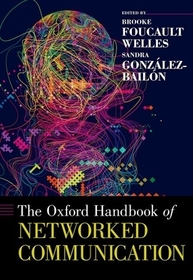
The Oxford Handbook of Networked Communication
Sorozatcím: Oxford Handbooks;
-
10% KEDVEZMÉNY?
- A kedvezmény csak az 'Értesítés a kedvenc témákról' hírlevelünk címzettjeinek rendeléseire érvényes.
- Kiadói listaár GBP 145.00
-
69 273 Ft (65 975 Ft + 5% áfa)
Az ár azért becsült, mert a rendelés pillanatában nem lehet pontosan tudni, hogy a beérkezéskor milyen lesz a forint árfolyama az adott termék eredeti devizájához képest. Ha a forint romlana, kissé többet, ha javulna, kissé kevesebbet kell majd fizetnie.
- Kedvezmény(ek) 10% (cc. 6 927 Ft off)
- Kedvezményes ár 62 346 Ft (59 378 Ft + 5% áfa)
Iratkozzon fel most és részesüljön kedvezőbb árainkból!
Feliratkozom
69 273 Ft

Beszerezhetőség
Megrendelésre a kiadó utánnyomja a könyvet. Rendelhető, de a szokásosnál kicsit lassabban érkezik meg.
Why don't you give exact delivery time?
A beszerzés időigényét az eddigi tapasztalatokra alapozva adjuk meg. Azért becsült, mert a terméket külföldről hozzuk be, így a kiadó kiszolgálásának pillanatnyi gyorsaságától is függ. A megadottnál gyorsabb és lassabb szállítás is elképzelhető, de mindent megteszünk, hogy Ön a lehető leghamarabb jusson hozzá a termékhez.
A termék adatai:
- Kiadó OUP USA
- Megjelenés dátuma 2020. március 18.
- ISBN 9780190460518
- Kötéstípus Keménykötés
- Terjedelem680 oldal
- Méret 178x249x55 mm
- Súly 1202 g
- Nyelv angol 134
Kategóriák
Rövid leírás:
Online communication technologies have opened up a new world of research questions about how people form relationships, organize into groups and communities, and navigate the boundaries between public and private life. This handbook brings together research from a variety of disciplines that examine these questions through the lens of new data. The result is a new theoretical framework that capitalizes on the constantly pulsating signals of networked communication, and offers an innovative approach to the study of human behavior and opinion formation.
TöbbHosszú leírás:
Communication technologies, including the internet, social media, and countless online applications create the infrastructure and interface through which many of our interactions take place today. This form of networked communication creates new questions about how we establish relationships, engage in public, build a sense of identity, and delimit the private domain. The ubiquitous adoption of new technologies has also produced, as a byproduct, new ways of observing the world: many of our interactions now leave a digital trail that, if followed, can help us unravel the rhythms of social life and the complexity of the world we inhabit--and thus help us reconstruct the logic of social order and change.
The analysis of digital data requires partnerships across disciplinary boundaries that--although on the rise--are still uncommon. Social scientists and computer scientists have never been closer in their goals of trying to understand communication dynamics, but there are not many venues where they can engage in an open exchange of methods and theoretical insights. This handbook brings together scholars across the social and technological sciences to lay the foundations of communication research in the networked age, and to provide a canon of how research should be conducted in the digital era. The contributors highlight the main theories currently guiding their research in digital communication, and discuss state-of-the-art methodological tools, including automated text analysis, the analysis of networks, and the use of natural experiments in virtual environments. Following a general introduction, the handbook covers network and information flow, communication and organizational dynamics, interactions and social capital, mobility and space, political communication and behavior, and the ethics of digital research.
Altogether the work achieves a comprehensive review of emerging methods and theory, while each chapter may also function as a stand-alone investigation into new methods and tools to shed light on some aspect of transmedia communication theory and practice, making the volume of particularly broad interest. It is a must-have for any institution with a program in communication and information science, data science, or media studies, but will also prove helpful to students and faculty researching public health methods and ethics.
Tartalomjegyzék:
Introduction
1. Introduction: Communication in the Networked Age
Brooke Foucault Welles and Sandra González-Bailón
Part I. Networks and Information Flow
2. Introduction to Part I, Networks and Information Flow: The Second Golden Age
David Lazer
3. Rebooting Mass Communication: Using Computational and Network Tools to Rebuild Media Theory
Katya Ognyanova
4. Propagation Phenomena in Social Media
Meeyoung Cha, Fabrício Benevenuto, Saptarshi Ghosh, and Krishna Gummadi
5. Dynamical Processes in Time-Varying Networks
Bruno Gonçalves and Nicola Perra
6. Partition-Specific Network Analysis of Digital Trace Data: Research Questions and Tools
Deen Freelon
Part II. Communication and Organizational Dynamics
7. Introduction to Part II, Communication and Organizational Dynamics: How Can Computational Social Science Motivate the Development of Theories, Data, and Methods?
Noshir Contractor
8. The New Dynamics of Organizational Change
Matthew S. Weber
9. Online Communication by Emergency Responders During Crisis Events
Emma S. Spiro
10. Studying Populations of Online Communities
Benjamin Mako Hill and Aaron Shaw
11. Gender and Networks in Virtual Worlds
Grace Benefield and Cuihua Shen
Part III. Interactions and Social Capital
12. Introduction to Part III, Understanding Social Dynamics Online: Social Networks, Social Capital, and Social Interactions
Nicole Ellison
13. The Analysis of Social Capital in Digital Environments: A Social Investment Approach
Hazel Kwon
14. Multiplying the Medium: Tie Strength, Social Role, and Mobile Media Multiplexity
Jack Jamieson, Jeffrey Boase, Tetsuro Kobayashi
15. Revolutionizing Mental Health with Social Media
MunMun de Choudhury
16. The Neuroscience of Information Sharing
Christin Scholz and Emily B. Falk
Part IV. Political Communication and Behavior
17. Introduction to Part IV, Political Communication Research in a Networked World
Michael X. Delli Carpini
18. Modeling and Measuring Deliberation Online
Nick Beauchamp
19. Moving Beyond Sentiment Analysis: Social Media and Emotions in Political Communication
Jamie E. Settle
20. Dynamics of Attention and Public Opinion in Social Media
Emilio Ferrara
21. A Satisficing Search Model of Text Production
Drew B. Margolin
22. Studying Networked Communication in the Middle East: Social Disrupter and Social Observatory
Javier Borge-Holthoefer, Muzammil M. Hussain, Ingmar Weber
Part V. Mobility and Space
23. Introduction to Part V, Mobile Space and Agility as the Subversive Partner
Carolyn Marvin
24. One Foot on the Streets, One Foot on the Web: Analyzing the Ecosystem of Protest Movements in an Era of Pervasive Digital Communication
Paolo Gerbaudo
25. Our Stage, Our Streets: Brooklyn Drag and the Queer Imaginary
Jessa Lingel
26. Digital Mapping of Urban Mobility Patterns
Christopher Morrison and Douglas J. Wiebe
27. Research on Mobile Phone Data in the Global South: Opportunities and Challenges
Seyram Avle, Emmanuel Quartey, David Hutchful
Part VI. Ethics of Digital Research
28. Introduction to Part VI, The Ethics of Digital Research
Jeffrey T. Hancock
29. Digital Trace Data and Social Research: A Proactive Research Ethics
Ericka Menchen-Trevino
30. A Practitioner's Guide to Ethical Web Data Collection
Alan Mislove and Christo Wilson
31. Responsible Research on Social Networks: Dilemmas and Solutions
Jon Crowcroft, Hamed Haddadi and Tristan Henderson
32. Unintended Consequences of Using Digital Methods in Difficult Research Environments
Katy E. Pearce
33. Ethical Issues in Internet Research: The Case of China
Bo Mai and Maria Repnikova
34. The Future of Communication Research
Sandra González-Bailón and Brooke Foucault Welles
Index





